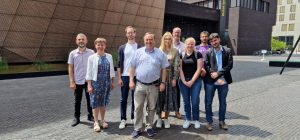The University of Luxembourg and Goodyear have launched a research project using the National Supercomputer MeluXina hosted by LuxProvide to tackle complex optimisation challenges. Goodyear is currently using simulation models to optimise production processes at the factory level. This collaboration aims to expand these models to a multi-factory scale and extend the simulations over large time periods. Due to the size and complexity of these simulations, standard computing platforms are insufficient, requiring the use of High-Performance Computing (HPC) systems.
‟ By leveraging MeluXina’s capabilities, we aim to optimise production processes more effectively across multiple factories and over extended planning horizons. This will enable us to achieve increased efficiency, reduced costs, and improved production planning.”

Chief Engineer of AI and Advanced Analytics, Goodyear.
The Collaborative and Distributed Optimization of Manufacturing Processes on High-Performance Computing Systems (CADOM) project will focus on developing distributed algorithms and a distributed discrete event simulation engine to run on HPC infrastructure.
With a duration of two years, the CADOM project will explore approaches such as parallel discrete event simulation and optimization. This initiative will advance optimisation and simulation for manufacturing, contributing to fields like distributed computing, multi-agent systems, and HPC.
‟ The CADOM project signifies a significant leap in applying high-performance computing to real-world manufacturing challenges. This collaboration illustrates how academia and industry can jointly address complex problems, enhancing manufacturing efficiency and innovation.”

Dean, Faculty of Science, Technology and Medicine
This research is supported by the Luxembourg Ministry of the Economy and the Luxembourg National Research Fund under the CADOM project, ref. 17941664.
